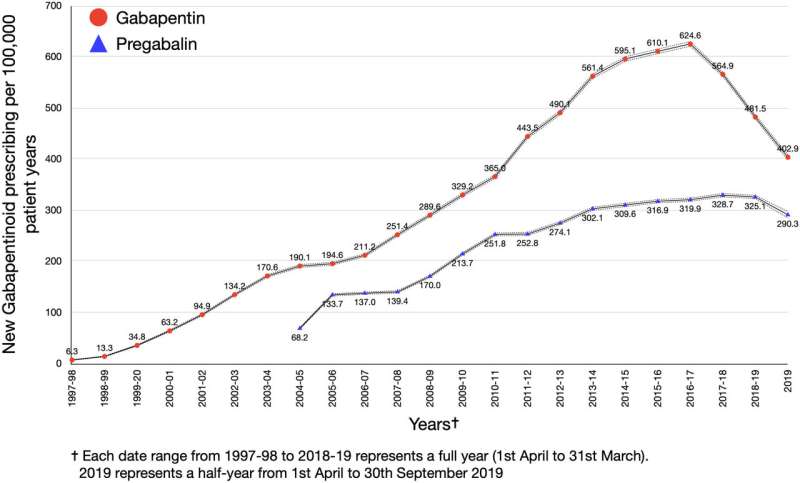This article has been reviewed according to Science X's editorial process and policies. Editors have highlighted the following attributes while ensuring the content's credibility:
fact-checked
trusted source
proofread
Prescription drug reclassification had 'limited' immediate impact, study finds

The reclassification of two prescription drugs as class C controlled substances, following concerns about people misusing and becoming addicted to them, had a "limited" immediate impact according to a new study.
The drugs—pregabalin and gabapentin—became illegal to possess without a prescription and illegal to supply or sell to others in the U.K. from April 2019. The move came after experts highlighted the potential for misuse, and rising numbers of fatalities linked to the drugs.
But the research carried out by scientists at Keele University did find the number of patients being newly prescribed the medicines has now begun to fall.
Gabapentin and pregabalin, known as gabapentinoids, are used to treat nerve pain, epilepsy and anxiety, and can bring about an elevated mood in users. However, they can also have serious side effects, particularly when used in combination with other drugs.
The study, published in The Lancet Regional Health—Europe, by a team of researchers from Keele University's School of Medicine and Midlands Partnership NHS Foundation Trust, looked at how prescribing changed during the period before and immediately after they were reclassified as controlled drugs.
The study revealed although prescribing might have peaked in the U.K., the immediate impact of their reclassification as controlled drugs on the prevalence of gabapentinoid prescribing has been limited.
Little change overall
Lead author, Dr. Julie Ashworth, Senior lecturer and Honorary Consultant in Pain Medicine, said, "While our study suggests that gabapentin prescribing may have peaked and fewer patients are being started on these drugs, there was little change in the proportion of patients receiving gabapentinoids overall.
"This is concerning given our findings that gabapentinoids are commonly prescribed with opioids and other central nervous system depressants. It also suggests that GPs are not stopping these drugs for existing users to any great extent, which may reflect the lack of other effective treatments and limited access to non-drug therapies for chronic pain in U.K. primary care."
More information: Julie Ashworth et al, Trends in gabapentinoid prescribing in UK primary care using the Clinical Practice Research Datalink: an observational study, The Lancet Regional Health—Europe (2023). DOI: 10.1016/j.lanepe.2022.100579



















